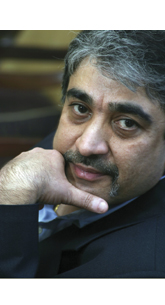At a dinner in Silicon Valley last year, some senior-level Carnegie Mellon engineering graduates reported that they were all spending their days managing other engineers. What was notable, however, was that the other engineers were in Belarus, Bangalore, Shanghai, and Romania—not in the United States. For these alumni, the globalization of the workforce into 24/7, multicountry supply chains was already a fact of life. Americans have just begun to feel its impact.

As our alumni know, globalization is moving quickly "up the food chain" from manufacturing to more knowledge-intensive areas, including design of new products and services. In 1995, close to 40% of the world's engineering work hours were based in the United States. By 2010, only 10% will be. Companies are shifting jobs and research and development to countries such as China and India, which provide high-quality work at lower cost.
The change has been accelerated by other nations' massive investments in engineering and science education, first in Taiwan, Singapore, and South Korea, and now in India and China. They all understand what America already knows: Knowledge creation drives future economic growth, and an educated labor force is essential for participation in the global economy.
The engineering faculty has recognized the nature of this challenge for our students and for the university itself. We are developing new ways to engage both global enterprises and the brightest young minds. We are creating new models of how a university can operate in the world, by, for example, offering master's degree programs in Greece, Japan, Australia, and soon Portugal.
We also are revamping the engineering curriculum. We still will emphasize depth in engineering knowledge, of course, but our graduates also must understand innovation, entrepreneurship, product development, and systems integration. Those skills will enable our graduates to lead organizations and manage effective teams. Graduates also will require greater knowledge of the world outside the United States and have experiences in working effectively with individuals from other cultures.
Such curriculum change will be challenging, but Carnegie Mellon has been leading education reform since 1936, when President Doherty's Carnegie Plan brought a more holistic approach to engineering studies. In 1990, we introduced new flexibility to the program so that students could customize their studies.
Now we are putting in place a curriculum that will allow students to enable, manage, and deploy innovation in a multilingual, multicultural, and multinational environment, while maintaining the strong foundation in technical skills. With support from the Marion Ewing Kaufmann Foundation, we are introducing such programs first at the graduate level in the engineering college, followed by a minor in Innovation Management throughout the university, and finally by revamping the whole undergraduate engineering curriculum with the theme of innovation.
This approach to education will create the comparative advantage we seek for our students and equip them with the skills they will need to be leaders of the global economy.
Pradeep K. Khosla is dean of the College of Engineering.
RELATED LINKS:
Pradeep K. Khosla
Carnegie Mellon College of Engineering
President Robert E. Doherty Carnegie Plan
Marion Ewing Kaufmann Foundation



